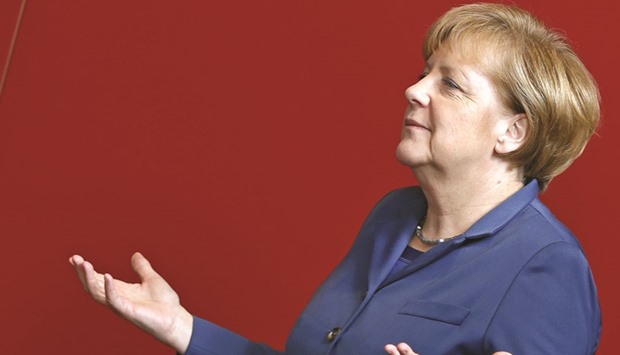German Chancellor Angela Merkel has joined the widespread condemnation of remarks made by a leading member of an anti-foreigner party about football international Jerome Boateng, slamming the comments as “vile”.
“The sentence as it appears is a vile and a sad sentence,” Merkel’s spokesman Steffen Seibert said after the deputy leader of the Alternative for Germany (AfD) party, Alexander Gauland, appeared to question whether people would like to have Boateng as a neighbour.
A member of the German World Cup winning team, Boateng, whose father is Ghanaian and mother German, was born in Berlin.
But Gauland hit back at critics of his remarks, telling DPA yesterday: “Of course I’m not a racist.”
On the question of whether people who have reservations about neighbours with foreign roots are racists, he said he would not go so far.
Globalisation and reunification have brought about considerable changes for many people, Gauland said.
Therefore, some responded with an “almost instinctive defence” to strangers in their neighbourhoods, said Gauland, who went on to say that he was not a football fan.
“Jerome Boateng has correctly pointed out the issue by saying: ‘Sad that such a thing still happens today’,” said Seibert.
The national football team had reacted “wonderfully” to Gauland’s remarks with a video entitled We are Diversity, said Merkel’s spokesman.
Gauland reportedly told the Sunday edition of the Frankfurter Allgemeine Zeitung: “People find him good as a footballer.”
“But they don’t want to have a Boateng as their neighbour,” he added.
His remarks triggered a storm of criticism from German political leaders, the media, top football officials and across social media.
“Boateng is a German,” Economics Minister and Vice-Chancellor Sigmar Gabriel tweeted. “The AfD is anti-German.”
Gauland’s comments also came as part of the build-up to next month’s European football championship, where Boateng will play as a member of the German national team.
His remarks also add to a recent series of extreme comments made by leaders of the AfD, which was launched on the German political stage three years ago at the height of the euro debt crisis as an anti-euro party.
But since then, the AfD has lurched dramatically to the right, helping the party to emerge as a major beneficiary of the refugee crisis that hit Germany last September.
The AfD is now represented in the parliaments of half of Germany’s 16 states, with the party a major winner of the March state elections held in Baden-Wuerttemberg, Rhineland-Palatinate in the western part of the nation and Saxony Anhalt in the east.
National support for the AfD currently stands at 12%, according to last week’s voter survey drawn up by pollsters Forsa.
This raises the prospects of the AfD becoming the first far-right party to enter the national German parliament since the Second World War in next year’s federal elections.
More recently, the AfD has also adopted a tough anti-Islam stance with the party’s programme now including a call for a ban on mosque minarets and the burqa, the all-encompassing body garment worn by some conservative Muslim women.
But even before then, AfD leaders have grabbed headlines with a round of often provocative remarks.
Emboldened by her party’s recent success, AfD leader Frauke Petry earlier this year called for refugees trying to illegally enter Germany to be shot at the border.
The AfD chief in the eastern German state of Thuringia, Bjoern Hoecke, has also called for “a thousand-year” Germany, echoing Hitler’s dream of a thousand-year Reich.
The AfD politician has also warned of the “surplus population in Africa”, resulting from the continent’s reproductive behaviour, which he said would not change as long Europe continued to take in African migrants and refugees.

Merkel: said that Gauland’s remark ‘as it appears is a vile and a sad sentence’, according to her spokesman.
